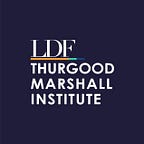Arkansas COVID-19 Update for African Americans: September 23, 2020
by Dr. Algernon Austin, Senior Researcher, Thurgood Marshall Institute
At this time, Arkansas has the seventh highest coronavirus case rate and the ninth highest COVID-19 death rate. Arkansas is the seventh worst state by the Black coronavirus-case disparity and the eighteenth worst state by the Black COVID-19-deaths disparity. Two of the top ten hot spots for new coronavirus cases in the state are majority African American counties. Three other hots spots are disproportionately African American.
Arkansas’s Covid Exit Strategy rating: Uncontrolled Spread (worst of four categories)
As of September 23, 2020, Arkansas had the seventh highest number of new coronavirus cases per 100,000 over the last seven days of any state in the United States. It had the ninth highest number of COVID-19 deaths per 100,000 over the same period.[1]
New coronavirus cases are on a strong upward trend in Arkansas (Figure 1). The state epidemiologist warns residents that there is an increasing number of people becoming infected at church events, funerals, and other gatherings.[2]
In recent days, the trend for deaths has been a bit erratic because of a large number of deaths being reported on one day which disrupts the rolling average. But for several days recently the 7-day average was around 30 deaths per day (Figure 2).
Using data collected on September 20, 2020 by the COVID Tracking Project, the Thurgood Marshall Institute ranked states by the discrepancy between the share of Black people in the population and the share of Black coronavirus cases and COVID-19 deaths. Arkansas was the seventh worst state by the Black coronavirus-case disparity and the eighteenth worst state by the Black COVID-19-deaths disparity. Although 15.7 percent of Arkansas’s population is Black, Black people made up 21.2 percent of the state’s coronavirus cases and 19.6 percent of the COVID-19 deaths.[3]
Black communities in Arkansas should be very concerned and highly vigilant about COVID-19. Five of the top ten counties by coronavirus-case rates have an over-representation of African Americans (see table). African Americans are the majority in two of these counties. Also, of the top ten counties for COVID-19 deaths, Black people are over-represented in half and are the majority in two. Since it appears that Black Arkansans are disproportionately affected by the coronavirus, they should use their voices to call for stronger policies and more resources to address the pandemic in their state.
The Arkansas State Department of Health calls on residents to follow COVID-19 public health guidelines which include maintaining a six foot physical distance from others in public, wearing face masks when not at home, washing ones hands frequently, and getting tested if you think you have been exposed to the coronavirus.[4]
Additional Resources
Arkansas Department of Health COVID-19: https://www.healthy.arkansas.gov//programs-services/topics/novel-coronavirus
Covid Exit Strategy: https://www.covidexitstrategy.org
[1] Coronavirus in the U.S.: Latest map and case count, N.Y. Times (Sept. 24, 2020), https://www.nytimes.com/interactive/2020/us/coronavirus-us-cases.html.
[2] Andy Davis and Cynthia Howell, Official Warns of State Virus Cases’ Links to Gatherings, Ark. Democrat-Gazette, Sept. 24, 2020, https://www.arkansasonline.com/news/2020/sep/24/official-warns-of-cases-links-to-gatherings/?news-arkansas.
[3] The share of cases and deaths is a conservative estimate. In many states, a substantial portion of the cases and deaths are of an unknown race. If any of these unknowns are Black, the Black share of cases and deaths would be higher. States where more than a third of the cases or more than a third of the deaths are of unknown race are not included in the specific disparity ranking.
[4] COVID-19, Ark. Dep’t of Health (last visited Sept. 25, 2020), https://www.healthy.arkansas.gov//programs-services/topics/novel-coronavirus.
